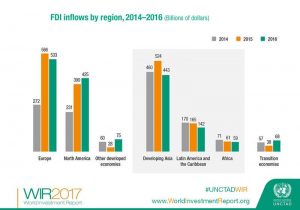
3 May, 2017/–Despite having a 31.7% decline in foreign direct investment (FDI) projects in 2016, and weak growth in recent years, West Africa’s second largest economy, Ghana, remains a key FDI market.
The country’s improving macro-economic environment and strong governance track record has seen Ghana rise to fourth position in the 2017 EY Africa Attractiveness Index (AAI) as against sixth position in 2016.
Introduced in 2016, the AAI measures the relative investment attractiveness of 46 African economies on the basis of a balanced set of shorter and longer-term focused metrics.
EY AAI 2017 country ranking — top 10
- Morocco 2. Kenya 3. South Africa 4. Ghana 5. Tanzania 6. Uganda 7. Cote d’Ivoire 8. Mauritius 9. Senegal 10. Botswana.
Staying in West Africa, Cote d’Ivoire also features in the top 10 of the AAI, and with a 21.4% jump in FDI projects in 2016, this illustrates that it’s becoming a country more favoured by investors.
Also in the west, Senegal has emerged as a potential major FDI destination although this is not reflected in its current FDI numbers. It does however rank strongly on the AAI 2017, taking eighth position, due to its diverse economy, strong strides in macro-economic resilience and progress in improving its business environment.
Ajen Sita, Africa CEO at EY, a global leader in assurance, tax, transaction and advisory services, noted, “By 2030, Africa remains on track to be a US$3 trillion economy. However growth needs to become more inclusive and sustainable to eradicate poverty at the levels that are required”.
“If we accept the reality that physical connectivity – enabled by regional integration and the development of physical infrastructure – will remain a key stumbling block to inclusive growth across Africa for at least the next decade, then the need to actively embrace digital connectivity becomes critical”.
However, efforts to harness the potential of digital technologies as a fundamental driver of inclusive growth are still far too piecemeal and fragmented, according to Sita.
“What is required is a far more collaborative effort between governments, business and non-profit organisations to adopt technological disruption, and create digitally enabled offerings with a particular focus on health, education and entrepreneurship.”
African Eye Report




